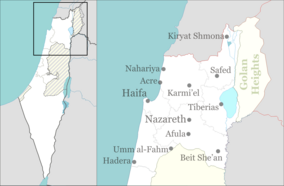This is an old revision of this page, as edited by Monkbot (talk | contribs) at 14:02, 25 October 2024 (Task 20: replace {lang-??} templates with {langx|??} ‹See Tfd› (Replaced 2);). The present address (URL) is a permanent link to this revision, which may differ significantly from the current revision.
Revision as of 14:02, 25 October 2024 by Monkbot (talk | contribs) (Task 20: replace {lang-??} templates with {langx|??} ‹See Tfd› (Replaced 2);)(diff) ← Previous revision | Latest revision (diff) | Newer revision → (diff)| Nahal Betzet Nature Reserve | |
|---|---|
| שמורת נחל בצת | |
 The arch known as Keshet Cave (Rainbow Cave), the remains of a large collapsed cave The arch known as Keshet Cave (Rainbow Cave), the remains of a large collapsed cave | |
 | |
| Location | Upper Galilee, Israel |
| Nearest city | Nahariya |
| Coordinates | 33°04′22″N 35°12′52″E / 33.0728°N 35.2144°E / 33.0728; 35.2144 |
| Area | 7,650 dunams (7.65 km; 2.95 sq mi) |
| Established | 1972 |
| Governing body | Israel Nature and Parks Authority |
Nahal Betzet (Hebrew: נחל בצת, lit. "Betzet stream"; Arabic: وادي كركرة, Wadi Karkara), is a once-perennial and now intermittent stream in the Upper Galilee, Israel. Most of it is part of the nature reserve named for the stream.
Geography
The stream crosses the border from Lebanon into Israel between Shtula and Zar'it, and flows westward, emptying into the Mediterranean Sea south of Rosh HaNikra. The stream runs along a geological fault line through dolomite and limestone, and is fed along its course by springs. Currently, Mekorot (the national water company) pumps the water of the stream's springs, and has been accused of causing the stream to dry up. Many caves are formed on the banks of the stream, most notably the arch known as Keshet Cave (Rainbow Cave).
Nature reserve
Most of the stream is part of a nature reserve that bears its name. The reserve, declared in 1972 covers 7650-dunam and part of it reaches the Israel-Lebanese border. In 2009, 1225 dunams were added to the reserve.
Flora in the area includes Nerium oleander, Platanus orientalis, and Adiantum capillus-veneris.
Gallery
-
 Nahal Betzet
Nahal Betzet
-
 Ruins at Nahal Betzet, identified as Khirbet Karkara, an archaeological site in Israel.
Ruins at Nahal Betzet, identified as Khirbet Karkara, an archaeological site in Israel.
-
 Sarach Cave, a stalactite cave home to insect-eating bats, where visitors are advised not to disturb the bats.
Sarach Cave, a stalactite cave home to insect-eating bats, where visitors are advised not to disturb the bats.
See also
References
- "Nahal Betzet Nature Reserve" (in Hebrew). iNature.info. Retrieved 2010-10-05.
- "Nahal Betzet Nature Reserve". ProtectedPlanet.com.
- "List of National Parks and Nature Reserves" (PDF) (in Hebrew). Israel Nature and Parks Authority. Archived from the original (PDF) on 2009-10-07. Retrieved 2010-09-27.
External links
- Real Estate Developers and Environmentalists Clash Over Nahal Betzet Beach in Western Galilee
- Hike in Nahal Betzet
| Nature reserves of Israel | |||||||||||
|---|---|---|---|---|---|---|---|---|---|---|---|
| Jerusalem District | |||||||||||
| Northern District |
| ||||||||||
| Haifa District |
| ||||||||||
| Central District | |||||||||||
| Southern District |
| ||||||||||
| Judea and Samaria Area | |||||||||||
| Located in the Israeli-occupied Golan Heights and West Bank. | |||||||||||